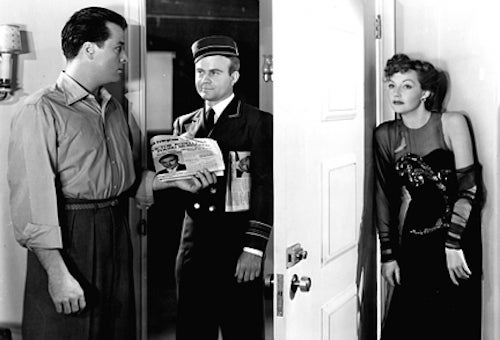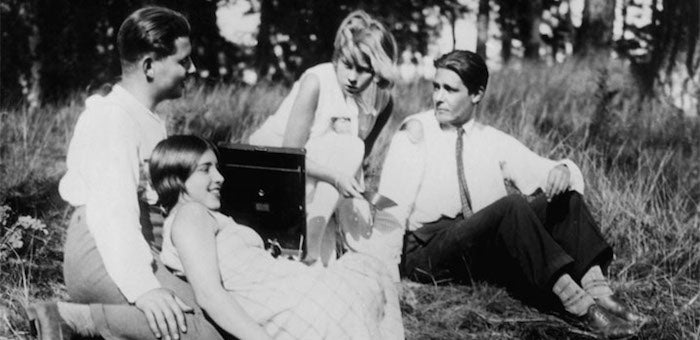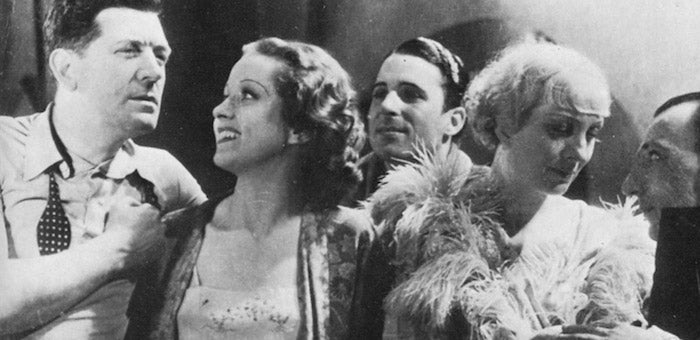 The Night Before the Divorce (1942)
The Night Before the Divorce (1942)
Hosted by the Society for Cinephiles, Cinecon Classic Film Festival celebrated its 50th anniversary on Labor Day weekend at the Egyptian Theatre and the Loews Hollywood Hotel, with dealers rooms for paper memorabilia. Five days of screenings of classic Hollywood films followed, with a rich and varied program of silent films, comedy shorts, dramas and high melodramas. With news that the similar Syracuse Cinefest will shutter after its March 2015 iteration, Cinecon becomes all the more important as a site to see rare classic Hollywood films on a screen.
My own personal discovery at Cinecon this year was Robert Siodmak’s The Night Before the Divorce (1942), a screwball comedy starring Lynn Bari and Joseph Allen. Bari plays a super-smart wife married to a chemical engineer, who feels increasingly inferior and therefore is easy prey for a dumb, gold-digging blonde. Eventually, the heroine gets her man back in what the late film historian Gerald Mast called a “comedy of remarriage.” And like Woman of the Year (1942), which had Katharine Hepburn's journalist outshining her husband (Spencer Tracy), the film reflects changing gender roles in the face of a war economy. To be sure, it’s 67 minutes of fluff, but Bari is so effervescent, and the dialogue snappy, I was surprised by the director’s lightness of touch.
Now Robert Siodmak is best known for such dark film noir fare as The Spiral Staircase (1945), The Dark Mirror (1946), and The Killers (1946), and is not considered a comedy specialist. The Night Before the Divorce hardly received a nod when the Berlin Film Festival staged its retrospective of the Siodmak brothers in 1998. Indeed, Karl Prümm dismisses the film in the 1998 festival catalog, Siodmak Bros. Berlin – Paris – London – Hollywood, as technically inferior, declaring Siodmak to have been totally bored with the project (p. 132).
One does wonder why Siodmak was loaned out to Paramount to make this film for 20th Century-Fox, given his seeming lack of comedy experience. I’m assuming that having only recently arrived as a penniless émigré from France, Siodmak took anything he could get, while the studio probably felt they could test Siodmak on this B-film.

People on Sunday (1930)
In fact, Siodmak, who had made his debut as the director of the late silent classic, People on Sunday (1930), had also directed an UFA comedy in the style of American slapstick. Der Kampf mit dem Drachen (1930) had Felix Bressart starring as a luckless renter being tortured by a relentless landlady. Two years later, Siodmak directed another UFA comedy production, Quick (1932), starring Hans Albers and Lilian Harvey. While Albers plays a clown, the film is in fact closer to a black comedy, in that it hardly differentiates between reality and illusion, the world of vaudeville and that of a health sanatorium, run by a charlatan.
Driven into exile by the Nazis after 1933, as was his scriptwriting brother, Curt Siodmak, Robert landed in Paris, where he directed a number of highly successful films for French producers, including at least two comedies, La Crise est finie (1934), and La Vie parisienne (1935), while supervising fellow émigré Max Nosseck’s direction of Buster Keaton in Le Roi des Champs-Elysées (1934). La Crise est finie featured a script by Curt Siodmak, Max Kolpe and Friedrich Kohner, all of them refugees in Paris, as was Robert Siodmak. La Crise est finie is a depression era comedy-musical, but also an allegory of exile: a theatre troupe revolts against its dictatorial, provincial management and goes to Paris, where they squat in an abandoned theatre. They proclaim the end of the crisis and the beginning of a new era, the eternal hope of the émigré captured in the film’s final euphoric fantasy sequence. The troupe’s homeless state, without any source of income other than what they can generate in the moment, reflects the exile’s experience.

La Crise est finie (1934)
On the other hand, the key to the strong central female character in The Night Before the Divorce may lie in the script, which was based on a play by Gina Kaus and Ladislaus Fodor. In fact, the play – which Kaus’ old friend, the literary agent George Marton had sold to Fox as early as 1937 – was an adaptation of a novel that Kaus had published in Berlin in 1931. Morgen um neun (9 a.m.) follows a couple the night before their divorce, as they confess all their various sexual infidelities to each other. Obviously, the sexual content had to go, given the so-called Hays Code in Hollywood. No less than 10 American writers worked the story between ’37 and film production in 1941, so it is unclear what remained of the original play. However, the strong female was modeled on the novel’s heroine and on Kaus herself, who was an amazingly liberated woman. She had scandalized both Vienna and Berlin in the 1920s with serial marriages and lovers, and also won dozens of literary prizes before her books were burned by the Nazis in 1933. But that is a subject for a future blog.






 Mobile Navigation
Mobile Navigation

